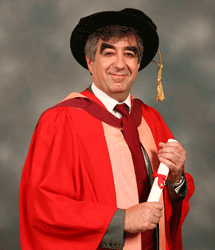Professor John Collinge CBE, FRS
Doctor of Science
15 July 2008 – Orator: Professor Tony Clarke
Mr Vice-Chancellor, 
It is my privilege, this morning, to propose Professor John Collinge of University College London for an Honorary Doctorate from the University of Bristol.
When assessing Professor Collinge’s contribution to science and medicine, a glance at the list of his current positions is quite telling; he is Professor of Neurology and Head of the Department of Neurodegenerative Disease at the Institute of Neurology, director of the MRC Prion Unit, Honorary Consultant in Neurology and Molecular Genetics, St Mary's Hospital, Honorary Consultant Neurologist and Clinical Director of the National Prion Clinic, National Hospital for Neurology and Neurosurgery.
Although all these positions are held in London, in his academic career Professor Collinge has local roots, graduating from Bristol in Pharmacology in 1981 and Medicine in 1984 before training in clinical neurology at St. Mary's Hospital and the National Hospital for Neurology and Neurosurgery in London. During this early period while a Senior House Officer his interests were drawn to the field of neuro-degeneration – particularly the human prion diseases (exemplified by CJD (Creutzfeldt-Jakob disease) and Kuru) – which at that time were biologically fascinating but did not have the newsworthy status they later acquired.
In the period 1987-1992 he went from Senior House Officer in Medicine at the Hammersmith to be Senior Registrar in Neurology, St Mary's Hospital. In 1990 he set up a small research group at St Mary’s funded by the Wellcome Trust. His work in this period was extremely influential and led the way in mapping mutations that caused inherited prion diseases in humans, identifying genetic risk factors for prion diseases in general and looking at genetic influences in other neurological disorders. In recognition of his early research promise he was made Wellcome Senior Research Fellow in the Clinical Sciences in 1992 and Wellcome Principal Research Fellow in 1996. Essentially this gave him the chance to develop an independent research group.
I first met Professor Collinge in 1992, shortly after he had become a research fellow. He was giving a seminar in the Bristol Medical School which I attended with a fledgling research group who were captivated by both the subject and the enthusiasm and eloquence of the speaker. So, as tradition demands, we invited him to The Robin Hood – the Medical School’s house of refreshment and contemplation, Mr Vice-Chancellor – where he was sufficiently persuasive to convince a hoard of sceptical physical-science boffins that this was the area of protein science. It is during encounters like these that Professor Collinge has stimulated a generation of molecular scientists to attempt to understand what prions are.
So this is, perhaps, a good point at which to explain the basics of the science that Professor Collinge has tackled over the last eighteen years. We are used to infectious agents such as viruses and bacteria having orthodox genetic material, so that genes are composed of DNA or RNA and can replicate by the classic Watson and Crick mechanism. Prions, however, are not like that. They are self-replicating particles made from a normal cellular protein that gets subverted. Such particles can arise by an inherited defect in this protein or they can be acquired by infection. In Professor Collinge’s early genetic work, his observations were central to our understanding of the mechanism behind the protein-only hypothesis. This has led on to his success in diagnosis of CJD using molecular methods, the identification of variant CJD and ultimately to the demonstration that variant CJD was caused by the same type of prion that was responsible for the BSE epidemic.
His current positions as Professor of Neurology and Director of the MRC's Prion Unit have presented great responsibilities and, along with this, huge opportunities that he has used to impressive effect. The Unit alone has around 90 staff and I know from my own observations that the running of such a diverse group of scientists requires not only a renaissance brain, but also a little of the Nelson touch. In his capacity as Director, he has forged a uniquely close partnership between his research unit and GSK (GlaxoSmithKline), in which the search for anti-prion therapeutics is going on apace and which offers one of the best chances we have of curing a neurodegenerative disease.
In terms of his leadership in more public areas, he is a founder fellow of the Academy of Medical Sciences, and he has served on many advisory committees both in the UK and abroad. In particular he was the leading scientific advisor on SEAC (Spongiform Encephalopathy Advisory Committee) and the dominant voice in warning of the possibilities of prion diseases being spread from animals to humans. By this, he was instrumental in avoiding a much more perilous situation for public health by insisting on measures that prevented potentially infected meat entering the human food chain.
For his contribution to medical research, he was awarded a CBE in 2004 and in 2005 he was elected a Fellow of the Royal Society for his fundamental work on prion propagation and on the molecular basis of prion strains.
Mr Vice-Chancellor, I commend to you John Collinge, as eminently worthy of the degree of Doctor of Science, honoris causa.